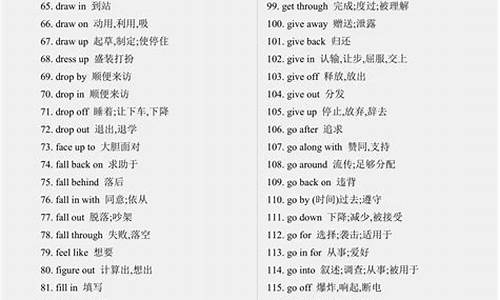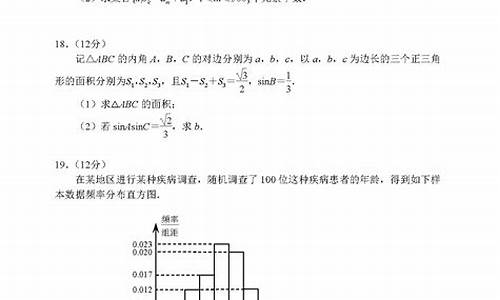您现在的位置是: 首页 > 教育新闻 教育新闻
高考专考动词,高考英语动词用法
tamoadmin 2024-06-03 人已围观
简介1.高考英语语法:高考英语总复习语法专项 情态动词2.英语高考中十三类高频动词都有哪些?情态动词must, will, would, ought to, should, can, could, may, might都有表推测的用法,除了can只用于现在或过去时间外,其它各词都可以对过去、现在或将来的情况是否发生,做出语气强弱不同的猜测。分析历年高考试题,我们不难发现高考对情态动词推测这一用法的考查
1.高考英语语法:高考英语总复习语法专项 情态动词
2.英语高考中十三类高频动词都有哪些?

情态动词must, will, would, ought to, should, can, could, may, might都有表推测的用法,除了can只用于现在或过去时间外,其它各词都可以对过去、现在或将来的情况是否发生,做出语气强弱不同的猜测。分析历年高考试题,我们不难发现高考对情态动词推测这一用法的考查“情有独钟”。考点主要集中对被猜测时间的确定和对语气强弱的把握上。因此,在运用情态动词进行猜测时,我们应着重把握以下两点:
一、确定被猜测时间,正确判断动词时态形式。
1.对现在或将来的情况进行猜测,用“情态动词+do”的形式;对现在或将来正在进行的情况进行猜测,用“情态动词+be doing”的形式。如:
①He may/ might come tomorrow.明天他可能会来。(将来)
②He may/ might know it.他可能知道这事。(现在)
③He may/ might be waiting for you now.他可能正在等你。(现在进行)
④He may/ might be waiting for you when you get there tomorrow.明天你到那里时,他可能会在等着你。(将来进行)
2. 对过去或已发生的情况进行猜测,用“情态动词+have done”的形式;对过去进行或现在完成进行的情况进行猜测用“情态动词+have been doing”的形式。如:
①He might have seen the film yesterday.昨天他可能已看了那部影片了。(过去)
②He may/ might have arrived in Beijing by now.现在他可能已到达北京了。(现 在完成)
③He might have been waiting for you when you phoned him.你给他打电话时,他可能已在等你了。(过去完成进行)
二、把握猜测语气特点,选择恰当情态动词。
1. 熟记情态动词的语气特点和用法限制。
1)表示肯定的猜测时,各情态动词语气强弱如下:
最强——must(一定)
will (很有可能)
would(很有可能)
ought to(应该,很有可能)
should(应该,很有可能)
can(可能)
could(可能)
may(可能)
最弱——might(可能)
2)表示否定的猜测时can't / couldn't语气最强,指“不可能”;may / might not语气最弱,意思是“可能不”。
3)一些情态动词表猜测时的用法限制。
must只用于肯定句;
may/ might一般不用于疑问句;
could可用于各种句式;而can多用于否定句、疑问句,用于肯定句时,多指“客观可能性”。如:
Lightning can be very dangerous.闪电可能会非常危险。
2. 把握题干猜测语气的强弱。
题干中如果有客观依据,应该选择猜测语气最强的情态动词;如果没有客观依据,则应选择猜测语气最弱的情态动词。如: —Are you coming to Jeff's party?
—I'm not sure. I ________go to the concert instead.
A. must B. would
C. should D.might
本题中的猜测没有客观依据。说话人对是否会去参加聚会还没拿定主意,去听音乐会也仅仅是有可能而已。因此,应选语气最弱项,答案为D。
另外,在特定的语境中,一些“情态动词+have done”不再对一件事情是否发生进行猜测,而是对已发生的事表达自己的看法,
有时具有一定的感情色彩。
①ought to/ should have done本该做(却未做);oughtn't to/ shouldn't have done本不该做(却做了),含有“责备”之意。如:
You shouldn't have done that; I had warned you of that several times.我已多次警告你,你本不该那么做的。
②might have done本可以做(却没有),有时表示很委婉的责备。如:
You might have phoned me, though you were busy then.你再忙也该给我打个电话。
③could have done本可能(却没有)如:
He could have caught the early bus, but he was delayed by helping a stranger.他本能够赶上早班车;他是因为帮一个陌生人而晚点的。
④would(not) have done本想做(却没做)/本不想做(却做了)。如:
I would have helped you, but I was too busy.我本想帮你,可我太忙了。
高考英语语法:高考英语总复习语法专项 情态动词
A
able a.能够,有能力的
be able to do sth能够做……
ability n.能力
▲absorb吸收/受
▲absent a.缺席,不在(absence n.)
▲accurate a..准确无误的
▲accuse v.指责,谴责,控告
achieve vt.达到,取得
▲achievement n.成就
afford vt.负担得起(…的费用),抽得出(时间),提供
against prep. 对着,反对
allow vt. 允许,准许
announce vt. 宣布,宣告
announcement n. 通告,通知
apologize vi. 道歉,谢罪
apology n. 道歉,歉意
appear vi. 出现
appearance n. 出现,露面,容貌
▲appointment n. 约会
▲appreciate v. 欣赏, 感激
▲approach v./ n.走近,靠近,临近
▲arise (arose, arisen) vi. 起来,升起,出现,呈现,发生
arm n. 臂, 支架
v. 以……装备,武装起来n. (美)武器,武力
take sth.in one’s arms搂抱
▲aspect n. 样子,外表,面貌,(问题等的)方面
(建筑物等的)方向,方位
assistant n. 助手,助理
▲association n.联合,联系,联盟,合伙,交际,交往
协会,英式足球=association football
astonish vt. 使惊讶
▲astronaut n. 宇航员
▲astronomer n.天文学家
▲astronomy n. 天文学
B
beat (beat, beaten) v. 敲打,跳动,打赢 n. (音乐)节拍
▲behaviour/ behavior n. 行为,举止
bend (bent, bent) vt. 使弯曲
bent a. 弯的
bitter a. 有苦味的,痛苦的,难过的,严酷的
blame n.& v. 责备, 责怪
block n. 大块,(木、石等)块,街区,路障 vt. 阻塞,阻挡
boil v. 沸腾,烧开,煮……
break (broke, broken) v. 打破(断,碎),损坏,撕开
n. 间隙
break down损坏,分解,抛锚
break out突然发生,爆发
break away from脱离
break into some place闯入,强行进入某个地方
break off打断
break in闯入,打断,插嘴
break up分解,分裂
▲brief a. 简洁的
C
calm a. 镇静的, 沉着的 v. 镇静, 沉着
▲cancel vt. 取消
charge v. 要求收费,索价,将(电池)充电 n. 费用,价钱
▲cheat n. & v. 骗取,哄骗,作弊
collect vt. 收集,搜集
combine vt. 使联合,使结合
comfortable a. 舒服的,安逸的,舒服自在的
command n. & v. 命令
▲comment n. 评论
▲company n. 公司
compare vt. 比较,对照
be compared to 被比作,与…相比
be compared with与…相比
compare …to…把..比作,把…与…相比
compare …with…把…与…相比
▲concentrate v.集中(注意力等于),专心
▲concept n. 概念, 观念
▲concern v. 与…有关,使(某人)(为…)担心
n.担心,关心
▲conclude v. 完成,结束
▲conclusion n.结论,结束
▲confirm v. 证实,确定
▲confuse v.使困惑,使糊涂
congratulation n.祝贺,庆贺
congratulate sb on sth祝贺某人某事
consider vt. 考虑
be considered as=be considered to be……被认为是
▲consist v. 包含,组成,构成
▲constant a. 经常的,不断的,始终如一的,恒久的
construction n. 建造,建设,建筑物
construct v.
▲consult v.咨询,查阅
contain v. 包含,包括,能容纳
container n. 容器
content a. 甘愿的,满意的
be content with对……满意
n. 内容
▲crime n. (法律上的)罪,犯罪
curious a. 好奇的,奇异的
▲ cycle vi. 骑自行车
D
damage n.& vt. 毁坏,损害
deaf. 聋的
debate n. & v.讨论,辩论
declare vt. 声明,断言
defeat vt. 击败,战胜
delay v.& n. 拖延,延误,延迟,延期,耽搁
detective n.侦探
devote vt. 把……奉献, 把……专用(于)
devote oneself to doing
be devoted to doing
dictionary n. 词典,字典 die v. 死
▲disappoint vt. 使失望
disturb vt. 扰乱,打扰
divide vt. 分,划分
doubt n.& v. 怀疑,疑惑
E
elect vt. (投票)选举
encourage vt. 鼓励
enjoy vt. 欣赏,享受……之乐趣,喜欢
enjoy oneself玩得开心
excellent a. 极好的,优秀的
expect vt. 预料,盼望,认为
F
fetch vt. (去)取(物)来,(去)带(人)来
fever n. 发烧,发热
fierce a. 猛烈的
forgive (forgave, forgiven) vt. 原谅,宽恕
G
general a. 大体的,笼统的,总的
generation n. 代,一代
▲goal n.(足球)球门,目标
government n. 政府
gradually ad. 逐渐地
graduate v. 毕业
▲guilty a. 有罪的,犯法的,做错事的
H
hit (hit, hit) n.& vt. 打,撞,击中
honest a. 诚实的,正直的
hurt (hurt, hurt) vt. 伤害,受伤,伤人感情
I
imagine vt. 想像,设想
improve vt. 改进,更新
increase v. & n. 增加,繁殖
▲influence n.& v. 影响
institute n. (研究)所, 院,学院
international a. 国际的
▲Internet n. 互联网,英特网
▲interpreter n.口译者 ,说明者
interrupt v. 打扰,打断
▲interview n.& vt. 采访,会见,面试
J
jam n. 果酱,阻塞
join v.参加,加入,连接,会合
join sb in doing sth加入……一起做
judge n. 裁判, 审判员, 法官 vt. 判断,断定
just ad.刚才,恰好,不过,仅
a. 公正的
just now刚才
▲justice n. 正义, 公正,司法
K
knowledge n.知识
get/have a knowledge of对……了解
L
labour/labor n. 劳动
labourer/laborer n. 体力劳动者
lack n.& vt. 缺乏,缺少
laugh n.& v. 笑,大笑,嘲笑
▲laughter n. 笑, 笑声
lead n. 铅
v. (led, led) 领导,带领
lead to导致
leader n.领袖,***
leading a. 最主要的,第一位的
leave (left, left) v. 离开,把……留下,剩下
liberate vt. 解放,使获自由
liberation n. 解放
load n. 担子,货物
M
machine n.机器
major a. 较大的, 主要的
majority n. 大多数
manage v. 管理,设法对付
Marxsim n.马克思主义
mental a. 精神的,脑力的
metal n. 金属 a. 金属制成的
mind n.思想,想法 mind
v. 介意,关心
never mind没关系,不要紧
别管,不用管,不用担心
少管闲事,不关你的事
更不用说,更谈不上
make up one’s mind决定,下定决心
▲modest a. 谦虚的,谦逊的
monitor n.(班级内的)班长,纠察生,监视器
v.监视
N
narrow a. 狭窄的
nation n. 民族,国家
native a. 本土的,本国的
nervous a. 紧张不安的
▲nest n. 巢, 窝
noble a. 高贵的,贵族的
O
object n. 物,物体, 宾语
▲observe v. 观察,监视,观测
occur vi. 发生
operate v. 做手术,运转,实施,负责, 经营,管理
operate on sb.给某人做手术
operation n. 手术,操作
▲operator n.接线员
oppose vt.反对,反抗
opposite n. 相反,对面 a. 相反的,对面的
optimistic a.乐观的
▲oral a. 口述的,口头上的
organise/organize vt. 组织
organiser/organizer n.组织者
▲organization n. 组织,机构
P
pain n. 疼痛,疼
particular a. 特殊的,个别的
passive a. 被动的
pause n.& vi. 中止,暂停,停止
perfect a. 完美的,极好的
perform v. 表演,履行,行动
persuade vt. 说服,劝说
political a.政治的
politician n.政治家
politics n.政治
pollute vt.污染
pollution n.污染
▲pond n.池塘
pool n.水塘,水池
poor a.贫穷的,可怜的,不好的,差的
popular=popa. (口语)(音乐、艺术等)大众的,
通俗的,受欢迎的
possession n. 所有,拥有,财产,所有物
pour vi. 倾泻,不断流出
practical a. 实际的,适用的
practice /practice n. 练习
v. 练习,实践
pretend vi. 假装,装作
produce vt.生产,制造
progress n. 进步,上进 vi. 进展, 进行
punish v. 惩罚,处罚
punishment n.惩罚
Q
quality n. 质量,性质
quantity n. 量,数
R
rapid a. 快的,迅速的
realize/realize vt.认识到,实现
▲reform v & n. 改革
regard v.把……看作
regards n. 问候,致意
register n. 登记簿,花名册,注册员
v. 登记,注册
regret n.& vt.可惜,遗憾,痛惜,哀悼
remain vt. 余下,留下 vi. 保持,仍是
remind vt.提醒,使记起
remind sb of sth提醒某人某事
▲replace vt. 取代
reply n. 回答,答复
report n.& v. 报道,报告
represent vt. 代表
revolution n. 革命,变革
rise (rose, risen) vi. 上升,上涨
rough a. 粗糙的,粗略的
S
sacrifice vt. 牺牲
scold vt. 责骂
▲senior a. 年长的,资深的,高年级的
n.上级,长辈,高年级生
sense n. 感觉,意识
▲sensitive adj 敏感的,神经过敏的
separate v.使分开,使分离a.单独的,分开的
separate…from与……隔开/分离
sheer a.全然的,纯粹的,地道的
adv.陡峭地,峻峭地
sick a. 有病的,患病的,(想)呕吐
▲sickness n. 疾病
smooth a. 光滑的, 平坦的
splendid a. 灿烂的,辉煌的,(口语)极好的
standard n. & a. 标准(的)
stare vi. 盯,凝视
stare at注视,凝视
glare at 瞪眼,怒目而视
starve v.使饿死,饿得要死
starvation n. 饥饿,饿死
struggle vi. 斗争
▲swallow vt. 吞下, 咽下
T
tear n. 眼泪 v. (tore, torn)扯破, 撕开
technical a. 技术的,工艺的
technique n. 技术, 技巧,方法
▲technology n. 技术
▲teenager n. (13~19岁的)青少年,十几岁的少年
telegram n. 电报
telegraph v. (拍) 电报
telephone/phone v.打电话 n. 电话
television/TV n.电视机
tractor n. 拖拉机
translate vt. 翻译
▲translation n. 翻译, 译文
▲translator n. 翻译家,译者
transport n.& vt.运输
U
uniform n. 制服
V
valuable a. 值钱的,贵重的
value n. 价值,益处
variety n. 种种,种类
various a. 各种各样的,不同的
W
wealth n.财产,财富
whisper v.低语,私下说
wire n.电线
wonder v.对……疑惑,感到惊奇,想知道
n.惊讶,惊叹;奇迹
wonderful a.美妙的,精彩的;了不起的;太好了
wound vt. 伤,伤害 n.创伤,伤口
英语高考中十三类高频动词都有哪些?
《高考英语总复习语法专项 情态动词》由留学英语组我整理(www.liuxue86.com)。本内容整理时间为05月12日,如有任何问题请联系我们。
高考英语总复习语法专项 情态动词
2009-03-18 11:48 来源:互联网 作者:佚名 [打印] [评论]
情态动词有一定的词义, 表示某种感情或语气, 是不完全动词, 不能单独作谓语, 需和实义动词一起构成谓语. 常见的情态动词有: can / could, may / might, must, shall / should, will / would, need, ought to, dare / dared等
一.may / might的用法:
1.表示?可以?, 即表示说话人许可或请求许可
a. You may take it away.
b. May I come in ?
2.表示?可能, 也许? (在疑问句中通常不用may / might, 而用likely, do you think, can等表示?是否可能, 会不会?的意思)
a. He may come today.
b. Is it likely to rain ?
c. Do you think the train will be late ?
d. Can the news be true ?这消息会是真的吗?
3.在提建议时, 可用May I
a. May I carry your bag ?
b. May I make a suggestion ?
二.can / could的用法:
1.表示许可或请求许可, 相当于may. 但can比may用得更广泛. can不仅表示说话人同意, 准许, 还可以表示客观条件许可. may通常只表示说话人同意或准许
a. The class is over. You can go home now.
b. You can go there tomorrow.
c. Can I borrow your car for today ?
2.在提建议时, 可用Can I / you
a. Can I buy you a drink ?
3.表示?会, 能?, 相当于be able to
a. He can speak English.
b. Can you play tennis ?
c. Little Tom can?t move the big box.
4.在疑问句中表示怀疑, 不确定或不会有的情况, 即?否定的推测?
a. Can it be true ? 这是真的吗?
b. Can it be true that he has passed the exam ? 他真的通过考试了吗?
5.can?t / couldn?t在陈述句中可表示?肯定不, 一定不?的意思
a. He can?t be in the room right now.
b. It can?t have rained last night, for the ground is dry.
6.can?t / couldn?t help doing sth表示?不得不,忍不住做某事?
a. People couldn?t help laughing at the foolish emperor.
7.can / be able to do的区别:
①.be able to可用于各种时态, 而can只有现在时can和过去时could
②.be able to可以和另一个不完全动词连用, 如should be able to (应该能够), must be able to (必须能够)等, 而can则不可以这样用
③.强调?能力?时, 多用be able to
a. The patient was soon able to sit up and read.
④.can可用于人或其他事物作主语的句子中; be able to只用于有生命的名词或代词作主语的句子中
三.must的用法:
1.表示?必须?, 它的否定形式是need not / needn?t, 而不是must not / mustn?t, mustn?t表示禁止或不许做某事
a. You must set off at once.
b. You needn?t tell John about it.
c. You mustn?t play with fire.
2.表示?肯定是, 一定是?的推测意义; 与此对应, 表示?肯定不,一定不?用can?t, 而不用mustn?t
a. You must be very tired now.
b. If he had really been there, I must have seen him.
c. He must have gone away. We don?t see him anywhere.
3.must / have to的区别:
①.must / have to一般可以通用, 但must侧重于说话人主观上的看法, 即?说话人认为必须?; have to侧重于客观上的需要, 含有?客观上不得不?之意
a. If the person is not breathing, you must try to start his breathing.
b. You must / have to study with a teacher if you want to know how to do first aid.
②.must没有时态的变化, 一般用于表示现在或将来; have to有时态的变化, 可用于过去, 现在, 将来各种时态
a. We must study hard when we are young.
b. I think she must remain in hospital for a week.
c. We had to stay there for a whole day because of the rain.
d. We have to practise a lot if we want to speak English well.
e. The situation has changed; we will have to change our plan.
③.它们的否定式mustn?t / not have to有很大的不同: mustn?t表示?不要(做某事)?, 有禁止之意; not have to表示?不必要(做某事)?, 含有?客观上无此必要?之意
a. You mustn?t move a person if he is badly hurt.
b. You don?t have to be a doctor to do first aid.
四.would的用法:
1.表示主观意志和愿望, 即?愿意,想要?
a. Come here whenever you would.
b. He would not leave before he finished his work.
2.would do sth可以表示过去经常发生的动作, 相当于used to do sth
a. When we were children we would go swimming every summer.
b. On Sundays he would go fishing for hours when he lived in the countryside.
3.表示请求, 愿望, 语气客气, 委婉
a. I would like some tea.
b. Would you mind closing the door ?
c. Would you tell me something about your trip ?
4.表示推测, 表示?大概, 也许?的意思
a. That would be the pen you are looking for.那也许是你在找的笔吧
五.should的用法:
1.表示义务, 责任, 可译为?应当?
a. We should complete the text in time.
b. You should be so careless.
2.表示推测或推论, 可译为?可能, 应该是?
a. He should be home by now, I think.
b. He should have arrived in Nanjing by this time.
3.should / ought to的区别:
should / ought to一般可以通用. should侧重于说话人主观上的看法, 有时含有劝告, 建议的口气, 即 ?按我的想法应该如何?; ought to语气更强, 强调?有责任, 有义务做某事?或者 ?按道理应该如何?
a. ?I will start the work at once. I think you should start at once.?
b. ?I will start the work tomorrow. No. You ought to start at once.?
六.need的用法: need表示?需要?, 既可作为情态动词, 也可作实义动词
1.need作实义动词时, 注意以下用法:
①.need to do sth; ②.need sb to do sth; ③.need doing sth (主动形式表被动意义)
a. You need to remain in bed.
b. I need you to help me with the housework.
c. The garden needs watering.( =The garden needs to be watered.)
2.need作情态动词时, 多用于否定句及疑问句中, 不用于肯定句中
a. It is still early. You needn?t hurry. =You don?t need to hurry.
b. It is 11 o?clock. Need I go now? =Do I need to go now ?
3.对于用need的提问, 肯定回答用must, 否定回答用needn?t
a. Need I come? Yes, you must. / No, you needn?t.
七.dare / dared的用法: 表示 ?敢?, 既可作为情态动词, 也可作为实义动词
1.作为情态动词时, 主要用于否定句和疑问句中, 不用于肯定句中
a. Little Jane dared not go alone. =Little Jane didn?t dare to go alone.
b. Dare you go out alone at night ? =Did you dare to go out alone at night ?
2.作为实义动词时, 可用于: dare to do sth
a. Little Jane didn?t dare to go alone.
b. Did you dare to go out alone at night ?
3.should / ought to的区别:
should / ought to一般可以通用. should侧重于说话人主观上的看法, 有时含有劝告, 建议的口气, 即 ?按我的想法应该如何?; ought to语气更强, 强调?有责任, 有义务做某事?或者 ?按道理应该如何?
a. ?I will start the work at once. I think you should start at once.?
b. ?I will start the work tomorrow. No. You ought to start at once.?
六.need的用法: need表示?需要?, 既可作为情态动词, 也可作实义动词
1.need作实义动词时, 注意以下用法:
①.need to do sth; ②.need sb to do sth; ③.need doing sth (主动形式表被动意义)
a. You need to remain in bed.
b. I need you to help me with the housework.
c. The garden needs watering.( =The garden needs to be watered.)
2.need作情态动词时, 多用于否定句及疑问句中, 不用于肯定句中
a. It is still early. You needn?t hurry. =You don?t need to hurry.
b. It is 11 o?clock. Need I go now? =Do I need to go now ?
3.对于用need的提问, 肯定回答用must, 否定回答用needn?t
a. Need I come? Yes, you must. / No, you needn?t.
七.dare / dared的用法: 表示 ?敢?, 既可作为情态动词, 也可作为实义动词
1.作为情态动词时, 主要用于否定句和疑问句中, 不用于肯定句中
a. Little Jane dared not go alone. =Little Jane didn?t dare to go alone.
b. Dare you go out alone at night ? =Did you dare to go out alone at night ?
2.作为实义动词时, 可用于: dare to do sth
a. Little Jane didn?t dare to go alone.
b. Did you dare to go out alone at night ? 《高考英语总复习语法专项 情态动词》由留学英语组我整理(www.liuxue86.com)
高中英语合集百度网盘下载
链接:提取码:1234
简介:高中英语优质资料下载,包括:试题试卷、课件、教材、视频、各大名师网校合集。









